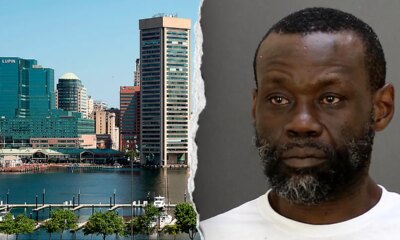Politics
High-tech and war are integrating some ultra-Orthodox Jews into Israel's secular society

Yakob Shoolman spent years studying the Torah, pouring over ancient scripture like many boys in his ultra-Orthodox Jewish neighborhood. He lived a sequestered religious life, marrying early and having four children before he was 30.
But these days Shoolman is learning how to code in a high rise with a view of the sea and a copy of a Steve Jobs biography nearby. His faith remains the center of his identity, but, like a number of students from traditional yeshiva schools, Shoolman wants to join this nation’s vibrant technology industry.
His aspirations come at a time when ultra-Orthodox Jews face increasing resentment from a larger, secular society over religious school subsidies and other benefits, including exemption from compulsory military service for Torah students. Those tensions and a move to limit the role of the Supreme Court led to mass street protests last year as far-right nationalist and religious parties became prominent voices in Prime Minister Benjamin Netanyahu’s coalition government. Many Israelis regard the power that religious parties wield as a threat to civil rights and the country’s democracy.
Students from ultra-Orthodox Jewish communities learn to code to become programmers and software developers at firms like Citibank and Mobileye.
That concern has been eclipsed somewhat as Israelis have united around the war with Hamas and a small but growing number of ultra-Orthodox Jews, known as Haredim, have started to push beyond the bounds of centuries-old tradition. They represent a generational shift that may lead to wider integration of religious conservatives into Israeli life and its economy.
“I don’t believe in separation. The gap between the Haredi and the secular is closing,” said Shoolman, 31, a student at JBH, a school that trains Haredi men to become programmers and software developers at firms like Citibank and Mobileye. “In this school, we’re exposed to many different people. It’s important to understand these worlds.”
He added that the war and an increased reliance on technology since COVID have drawn more ultra-Orthodox Jews out of their enclaves. Haredi have attended shivas for those killed by Hamas and 4,000 have volunteered for temporary emergency service in the army since the war began in October.
But moderates and secularists view such limited integration as hardly notable when Netanyahu’s government is increasing spending on Haredi projects. The government coalition’s discretionary spending for yeshiva schools — which teach little science or math — rose from $322 million in 2022 to $456 million in 2023. Hundreds of millions of dollars more have been allocated for cultural, religious and education programs, along with thousands of government funded jobs that benefit the ultra-Orthodox.
Haredim account for about 13% of Israel’s population of more than 9 million, but their average family size of about seven children is a drain on social welfare spending. The Israeli media have reported that poverty and low employment among Haredim could lead to a 16% tax increase on working Israelis and cost the nation’s economy $2 trillion over the next 40 years.
Students take a break between classes where they learn how to code and program. Ultra-Orthodox Jews face growing resentment from a larger, secular society over religious school subsidies and other benefits.
“The Haredim are the cornerstone to the clash of religion and state,” said Rabbi Uri Regev, head of Hiddush, an organization that advocates for religious freedom and equality. “This problem predates Netanyahu. All previous governments bent to the will of the Haredim.”
He added that the ultra-Orthodox, about 45% of whom are poor, “are a great weight and burden on society.”
”
A 2023 survey done by Hiddush before the war found that 70% of Jews in Israel believe the country’s “most acute internal conflict” is between ultra-Orthodox and secular Jews. The study showed that those fault lines were deep when it comes to military and educational issues: 78% opposed a blanket exemption on military service for ultra-Orthodox and 69% of Jews “support complete cancellation or a significant cut in funding” for yeshiva schools. That latter figure jumps to 93% for secular Jews.
Some fear the Haredim and the extreme right Religious Zionist Party could upset the Middle East and further damage prospects for peace with the Palestinans. Best-selling author and scholar Yuval Noah Harari wrote an essay in July in the left-leaning Haaretz newspaper under the headline: “What will happen to Judaism if Israeli democracy is destroyed by supremacist zealots?” He warned of “spiritual destruction” if a “messianic state” arises to persecute “Arabs, secular people, women and LGBTQ people.” What, he asked, “if that state were to embrace a racist ideology of Jewish supremacy?”
Haredim believe that God’s will shapes all destinies and that their devotion protects the state of Israel. They have long lived in segregated neighborhoods like Mea Shearim in Jerusalem and Bnei Brak near Tel Aviv. Men wearing side curls and black hats walk with sacred books to religious schools while Haredi women are the main breadwinners and child-care providers. Their large families gather on the Sabbath to stroll amid closed shops and quieted tram lines.
This portrait was resonant in the TV series “Shtisel”, about a Haredi father and his artistic son as they confronted nosy neighbors and matchmakers on cloistered streets while navigating the clamor and temptations of an encroaching outside world. The show was widely popular in Israel and provided a common ground that — for less than an hour each night — went beyond suspicions and stereotypes to give secular Jews a glimpse of a world few were intimate with.
Students at JBH, a school that trains Haredi men to become programmers and software developers, take a break and play a video game between classes.
“The other side needs to know that we are Israelis just like everyone else,” said Yitzhak Pindrus, a Knesset member of the ultra-Orthodox party United Torah Judaism, who blamed employers and the army for not doing more to integrate the Haredi. “We have a different culture and different traditions, but you don’t always need to come down on us.”
Computer students like Shoolman, whose wife founded a virtual reality production company, aspire to modern lifestyles and bigger incomes. That desire, however, is considered a threat by religious conservatives who worry such enticements may lead to liberal beliefs around marriage and civil rights — Haredi leaders have long opposed women praying at the Western Wall — and pull the young away from their faith.
“The Haredim are concerned that a person will become his work,” said Aaron Fruchtman, vice president of JBH, which has trained 500 Haredim since 2013, many of whom received government funds and private donations for tuition. “The question is, ‘How do we get a Haredi guy into the Israeli Defense Forces or into high-tech without him losing his religious identity?’ The Haredi idea is first you’re a servant of God, a Torah Jew. But integration in the workforce will break down barriers.”
The early days of Shoolman’s training were difficult. Like most students from yeshiva schools, Shoolman, whose family income is too high to receive public subsidies, knew no English and only a little math. “You’re starting from zero,” he said. “Literally from A,B,C.” He added that since the start of the pandemic, more younger Haredi have turned to technology, using email and rabbi-approved smartphones. His long hours of studying the Torah for years, he said, will help him with the rigors of coding and software.
“We have the ability to sit and learn and be dedicated,” Shoolman said as students played video game tennis on a big screen while others typed on keyboards. “The process of change is speeding up.” He tried to express the contradiction — the navigating of two unreconciled worlds— by joking, “I’m a mainstream, hardcore Haredi.”
The war with Hamas has led other Haredim into the military. Rabbi Ram Moshe Ravad, a Haredi who served for 29 years and retired as a lieutenant colonel and chief rabbi for the Air Force, helped enlist Haredi volunteers for short service after Oct. 7. Most had studied in yeshiva until age 26, which had allowed them military exemptions. Some volunteers went into basic training but many took nonfighting roles like mechanics, cooks and drivers.
“The Haredim are not against the army,” Ravad said. “What’s happened over the years, especially the last few years, is people have been coming out against Haredim. All these [political] movements were saying that Haredim are against the army. So the Haredim avoided serving in the army. Now we’ve come with a different approach. Whoever wants to learn the Torah should learn, and whoever isn’t learning should come [to the army].”
“The Haredim are concerned that a person will become his work,” said Aaron Fruchtman, vice president of JBH, which has trained 500 Haredim since 2013. “The question is, ‘How do we get a Haredi guy into the Israeli Defense Forces or into high-tech without him losing his religious identity?’ ”
Chemi Trachtenberg is a 21-year-old Haredi who enlisted three years ago. “It doesn’t matter if you like Bibi [Netanhayu] or not, if you like the Haredim or not,” he recently told the Jewish Telegraphic Agency, an international news service. “At the end of the day they [Hamas] want to kill us and we need prayers and weapons.”
The “Israelization” of the younger generation “of Haredim was already well underway when this war began,” Anshel Pfeffer wrote in a November opinion column in Haaretz. “It was only natural that those who were already less committed to cutting themselves off from society would feel shame as they saw hundreds of thousands of men and women their age being called up on the day of the [Hamas] massacre.”
He added: “For now, though, they remain a minority in their community. Aside from praying for Israel’s salvation, most of the Haredi groups have continued life as before.”
Regev, the rabbi, said to suggest the ultra-Orthodox are joining society is “an overly rosy characterization” when so many Haredim don’t have well-rounded educations that would benefit the nation’s economy. “The Haredi’s attitude of spiritual strengthening is anathema to the larger secular society,” he said, adding that the ultra-Orthodox oppose secular marriage, civil rights and using public transportation on the Sabbath. “They rely on the public coffers to perpetuate their own poverty.”
Regev said Israel faces two existential questions: the relationships between religion and state, and between Jews and Arabs. The one between religion and state, he said, often appears irreconcilable as the ultra-Orthodox place the sacred above the temporal even when it comes to immediate threats — from COVID to war — against Israel’s future.
Pindrus, the legislator, disagreed: “Haredim are part of the State of Israel,” he said. “What hurts the State of Israel hurts Haredim. Right now we’re in a period of pain, and we’re all feeling this pain.”

Politics
Video: Defense Officials Give No Timeline for War in Iran as U.S. Boosts Forces

new video loaded: Defense Officials Give No Timeline for War in Iran as U.S. Boosts Forces
transcript
transcript
Defense Officials Give No Timeline for War in Iran as U.S. Boosts Forces
At a Pentagon news conference, top defense officials said that the U.S. military was sending more forces to the Middle East and expects to “take additional losses.” Earlier, President Trump said that the U.S. could continue striking Iran for the next four to five weeks.
-
“We didn’t start this war, but under President Trump, we are finishing it. This operation is a clear, devastating, decisive mission. Destroy the missile threat. Destroy the navy. No nukes. President Trump has all the latitude in the world to talk about how long it may or may not take. Four weeks. Two weeks, six weeks. It could move up. It could move back. We’re going to execute at his command the objectives we’ve set out to achieve.” “We expect to take additional losses. And as always, we will work to minimize U.S. losses. But as the secretary said, this is major combat operations.” Reporter: “Are there currently any American boots on the ground in Iran?” “No, but we’re not going to go into the exercise of what we will or will not do. I think — it’s one of those fallacies for a long time that this department or presidents or others should tell the American people. This — and our enemies by the way — here’s exactly what we’ll do. Why in the world would we tell you, you, the enemy, anybody, what we will or will not do in pursuit of an objective?”
By Christina Kelso
March 2, 2026
Politics
Gas prices could jump as Middle East tensions threaten global oil supply

NEWYou can now listen to Fox News articles!
Americans could soon see higher gas prices as escalating tensions in the Middle East threaten a critical global oil chokepoint, raising fears of supply disruptions that could quickly reverberate across U.S. energy markets.
After joint U.S.–Israeli strikes, dubbed Operation Epic Fury, targeted Iranian sites over the weekend and killed Iran’s Supreme Leader Ayatollah Ali Khamenei, concerns quickly shifted to how Tehran might respond and whether oil infrastructure or tanker traffic could become collateral damage.
Any disruption to global crude supplies could translate into higher costs for American drivers at the pump.
“Every time we’ve had flare-ups in the Middle East like we’re seeing right now — and we’ve seen this kind of situation periodically over the last 50 years — it has caused significant disruption to energy markets,” economist Stephen Moore told Fox News Digital.
“I would expect we could see anywhere from 25 to 50 cents a gallon increase in gas prices in the short term,” he said.
Experts say Americans will likely pay more for gas due to the ongoing conflict in the Middle East. (Matthew Hatcher/Bloomberg/Getty Images)
Market data already shows prices moving higher.
Patrick De Haan, head of petroleum analysis at GasBuddy, said oil prices were up $5 per barrel, while wholesale gasoline prices had risen 11 cents per gallon.
He expects retail gas prices to begin climbing immediately, especially in areas where stations tend to adjust prices in sharp, periodic jumps.
The national average could hit $3 per gallon as soon as Monday, De Haan said, with some stations increasing prices by 10 to 30 cents this week and potentially more in markets that see larger price swings.
Moore warned that prices could climb further and remain elevated if vital transit routes or oil facilities are disrupted.
TRUMP PLEDGES TO ‘AVENGE’ FALLEN US SERVICE MEMBERS AS TENSIONS WITH IRAN INTENSIFY
The ongoing conflict in Iran is near a major energy corridor. (Contributor/Getty Images)
“Huge amounts of global oil travel through the Strait of Hormuz, so this could be incredibly disruptive, delaying delivery of oil and gas,” he said.
“The Iranians have already knocked out some oil facilities in the Middle East, and who knows what they’re up to next. When you have less supply, prices go up. The big question is whether this will be a temporary bump or something more prolonged.”
The ongoing conflict sits near the Strait of Hormuz, one of the world’s most strategically important energy corridors.
“This shipping route represents around 25% of global oil trade and 23% of liquefied natural gas trade,” explained Jaime Brito, executive director of refining and oil products at OPIS.
The Strait of Hormuz, a narrow shipping lane between Iran and Oman that has long been a flashpoint during regional crises, serves as a vital artery for global energy markets.
Roughly 20 million barrels of crude oil and petroleum products — about one-fifth of global oil supply — transit the strait each day, underscoring how disruption there can quickly send shockwaves through international energy markets.
HORMUZ ERUPTS: ATTACKS, GPS JAMMING, HOUTHI THREATS ROCK STRAIT AMID US-ISRAELI STRIKES
A satellite view of the Strait of Hormuz, a critical chokepoint for global energy supply, connecting the Persian Gulf to the Gulf of Oman. (Gallo Images/Orbital Horizon/Copernicus Sentinel Data 2025/Amanda Macias/Fox News Digital)
Highlighting the growing concern, Maersk, widely regarded as a bellwether for global ocean freight, said it will suspend all vessel crossings through the Strait of Hormuz until further notice and cautioned that services to Arabian Gulf ports may be delayed.
Still, not all price movements are immediate.
“Developments over the weekend in the Middle East should hypothetically take time to ripple into the global supply chain. An initial assessment would suggest no specific price impacts should be seen in the gasoline market across the world, including the U.S.,” Brito told Fox News Digital.
However, Brito said prices could climb quickly if markets expect trouble ahead, even before supplies are actually affected.
As a result, Brito said, developments in Iran may have already translated into higher gasoline, diesel and other fuel prices in parts of the U.S., depending on regional supply dynamics and individual company pricing strategies.
CLICK HERE TO DOWNLOAD THE FOX NEWS APP
Experts say the increase in gas prices will be largely determined by how long the conflict in the Middle East lasts. (John McCall/South Florida Sun Sentinel/Tribune News Service via Getty Images)
From a domestic standpoint, Brito added that gasoline prices follow a seasonal pattern, typically climbing during the summer travel months.
“March prices are not expected to be significantly high,” he said, noting that spring break travel could support demand in certain areas — but not at the level seen during peak summer driving season.
Ultimately, the direction of gasoline prices will depend less on seasonal demand and more on how the geopolitical situation unfolds in the days ahead.
Politics
Iran’s supreme leader killed in U.S.-Israeli attack, Trump says

TEHRAN — The U.S. and Israel pummeled Iran early Saturday in an attack aimed at razing the Islamic Republic’s nuclear ambitions and thwarting its efforts to influence the Middle East though proxies such as Hezbollah and Hamas.
Iran’s Supreme Leader Ayatollah Ali Khamenei was killed in the attack, according to President Trump, who in a post on Truth Social wrote that “one of the most evil people in History, is dead. This is not only Justice for the people of Iran, but for all Great Americans.”
More than 200 people were killed in Iran and hundreds more injured, according to Iran’s Red Crescent.
The attacks spurred a furious Iranian retaliation, with multiple barrages striking Israel, a number of Gulf nations and Jordan; and fulfilled long-standing fears that a confrontation with Iran would plunge the entire region into war.
Reports of Khamenei’s death prompted diverse reactions worldwide: In portions of Tehran and Los Angeles, home to a large Persian population, people took to the streets to celebrate. In New York, protesters gathered at Times Square to denounce the attack.
The attack came eight weeks after U.S. forces deployed by Trump toppled Venezuelan President Nicolás Maduro, and Trump said Saturday’s operation also presented a chance for regime change.
Addressing the Iranian people, Trump said, “When we are finished, take over your government. It will be yours to take.”
Trump made the comments in an eight-minute prerecorded video. “This will be probably your only chance for generations,” Trump said, adding, “For many years, you have asked for America’s help, but you never got it. No president was willing to do what I am willing to do tonight.”
The Iranian government confirmed Khamenei’s death.
The attacks began with Israeli strikes Saturday morning — a workday in Iran — on Tehran, the capital, with residents speaking of attacks near Khamenei’s compound, the presidential palace, Iran’s National Security Council, the ministries of defense and intelligence, the Atomic Energy Organization and a military complex.
-
Share via
In Tehran there were scenes of panic, with residents racing to stock up on supplies, leaving shelves bare in grocery stores across the city. Others, heeding warnings from authorities of further strikes, decided to leave the capital. Images on social media showed highways leading out of Tehran choked with traffic.
“It’s going to take 10 hours at least, but it doesn’t matter,” said Zainab, who was loading her car with whatever she could stuff inside for the drive to her sister’s home in Iran’s northeast.
By the end of the day, the streets of Tehran appeared all but abandoned, with residents hunkering down for a night punctuated by the sounds of blasts reverberating across the capital.
Israeli Prime Minister Benjamin Netanyahu, a vociferous advocate for attacking Iran — and who has spent years urging Washington to do so — said the campaign would continue “as long as needed.”
Trump, who long insisted Iran cannot have nuclear weapons, also addressed Iran’s efforts in the Middle East in his video message.
“We are going to ensure that the region’s terrorist proxies can no longer destabilize the region or the world, and attack our forces,” he said. “And we will ensure that Iran does not obtain a nuclear weapon.”
Trump also said U.S. military forces “may have casualties,” adding, “That often happens in war.”
The Iranian Foreign Ministry, in a statement, said that “Iranians have never surrendered to aggression.”
Iranian Foreign Minister Abbas Araghchi, who was leading Iran’s delegation in Oman-brokered negotiations, said the war on Iran was “wholly unprovoked, illegal and illegitimate.”
“Our powerful armed forces are prepared for this day and will teach the aggressors the lesson they deserve,” he wrote on X.

Iranians protest on Saturday in Tehran against attacks on Iran by Israel and the United States.
(Majid Saeedi / Getty Images)
Israel’s military said its attacks were the largest military flyover in its history, with some 200 warplanes dropping hundreds of munitions on about 500 objectives.
Outside of Tehran, explosions could be heard in other cities, including Isfahan, Karaj, Kermanshah, Qom and Urmia, according to Iranian state media. An attack on the city of Minab struck a girls’ school, killing at least 85 students and injuring dozens of others, state-run media said.
Iran’s Red Crescent later said 201 people were killed in attacks across the country, and that 24 out of Iran’s 32 provinces were hit. More than 700 people were injured.
Cellphone and internet communications were disrupted shortly after the attacks began but have since been restored.
Iran struck back across the Middle East, with barrages reported on U.S. bases in the United Arab Emirates, Qatar, Bahrain, Kuwait, Iraq, Saudi Arabia and Jordan. Debris from one of those missiles killed one person in the UAE; another struck a hotel in Dubai. A Kuwaiti airport was hit, but no injuries were reported.
Iran also dispatched multiple waves of missiles to Israel, with residents in Jordan, Syria and Lebanon seeing vapor trails crisscrossing the skies above and the explosive sounds of interceptions.
The waves of ordnance spurred airspace closures across the region, with many airlines suspending service to affected countries and leaving tens of thousands of people stranded.
Araghchi informed his Iraqi counterpart, Fuad Hussein, on Saturday that Tehran will limit its response to U.S. military bases in the region, and that Iran was acting in self-defense.
But the attacks nevertheless infuriated Arab governments. Many came out with statements excoriating Iran for what they described as an unprovoked attack on their sovereignty.
Russia, whose ties with Iran have deepened in recent years, demanded Israel and the U.S. halt military operations. According to the Associated Press, U.N. Ambassador Vassily Nebenzia said, “We insist on the immediate resumption of political and diplomatic settlement efforts … based on international law, mutual respect and a balance of interests.”
In a sign of the rapidly expanding impact of the war, messages purporting to be from Iran’s Islamic Revolutionary Guard Corps were sent to ships ordering them to stay away from the Strait of Hormuz with “immediate effect.”
Shutting the strait, a strategic passageway through which one-fifth of global oil supplies pass, would probably lead to an immediate spike in energy prices and disrupt other shipping.
The opening salvos of what promises to be a lengthy campaign come two days after the U.S. and Iran concluded a third round of Oman-brokered negotiations in Geneva aimed at reducing tensions and stopping the prospect of war.
On Friday, Trump expressed displeasure with the pace of the talks, saying the Iranian side was not negotiating in “good faith” or giving in to U.S. demands. But Oman’s Foreign Minister Badr Albusaidi said a deal was “within reach.”
On Saturday, Albusaidi expressed dismay that “active and serious negotiations have yet again been undermined.”
“Neither the interests of the United States nor the cause of global peace are well served by this. And I pray for the innocents who will suffer,” he said in a statement on X.
The American strikes on Iran drew immediate reaction on Capitol Hill as Democrats and a small bloc of Republicans accused the White House of sidelining Congress on actions they fear will trigger a broader conflict in the Middle East.
“By the president’s own words, ‘American heroes may be lost.’ That alone should have demanded the highest level of scrutiny, deliberation, and accountability, yet the president moved forward without seeking congressional authorization,” Sen. Mark Warner (D-Va.), the vice chair of the Senate Intelligence Committee, said in a statement.
Rep. Ro Khanna (D-Fremont) called on lawmakers to back a measure he is co-sponsoring with Rep. Thomas Massie (R-Ky.) that would compel the administration to seek congressional approval before engaging in any further activity in Iran.
“The American people are tired of regime change wars that cost us billions of dollars and risk our lives,” Khanna said in a video posted on X.
As Democrats warned of constitutional overreach, other lawmakers rallied behind the president.
Sen. Roger Wicker (R-Miss.), the Senate Armed Services Committee chairman, said in a statement that Trump had taken “decisive action against the threat posed by the world’s leading proliferator of terrorism, the Iranian regime.”
“This is a pivotal and necessary operation to protect Americans and American interests,” Wicker said.
Secretary of State Marco Rubio notified some members of Congress’ Gang of Eight, which are the top four leaders in the House and Senate and top Democrats and Republicans on the House and Senate intelligence committees, according to CBS News.
Bulos reported from El Obeid, Sudan, Ceballos from Washington, D.C., and special correspondent Mostaghim from Tehran.
-

 World5 days ago
World5 days agoExclusive: DeepSeek withholds latest AI model from US chipmakers including Nvidia, sources say
-

 Massachusetts5 days ago
Massachusetts5 days agoMother and daughter injured in Taunton house explosion
-

 Denver, CO5 days ago
Denver, CO5 days ago10 acres charred, 5 injured in Thornton grass fire, evacuation orders lifted
-

 Louisiana1 week ago
Louisiana1 week agoWildfire near Gum Swamp Road in Livingston Parish now under control; more than 200 acres burned
-

 Technology1 week ago
Technology1 week agoYouTube TV billing scam emails are hitting inboxes
-

 Politics1 week ago
Politics1 week agoOpenAI didn’t contact police despite employees flagging mass shooter’s concerning chatbot interactions: REPORT
-

 Technology1 week ago
Technology1 week agoStellantis is in a crisis of its own making
-

 News1 week ago
News1 week agoWorld reacts as US top court limits Trump’s tariff powers

















